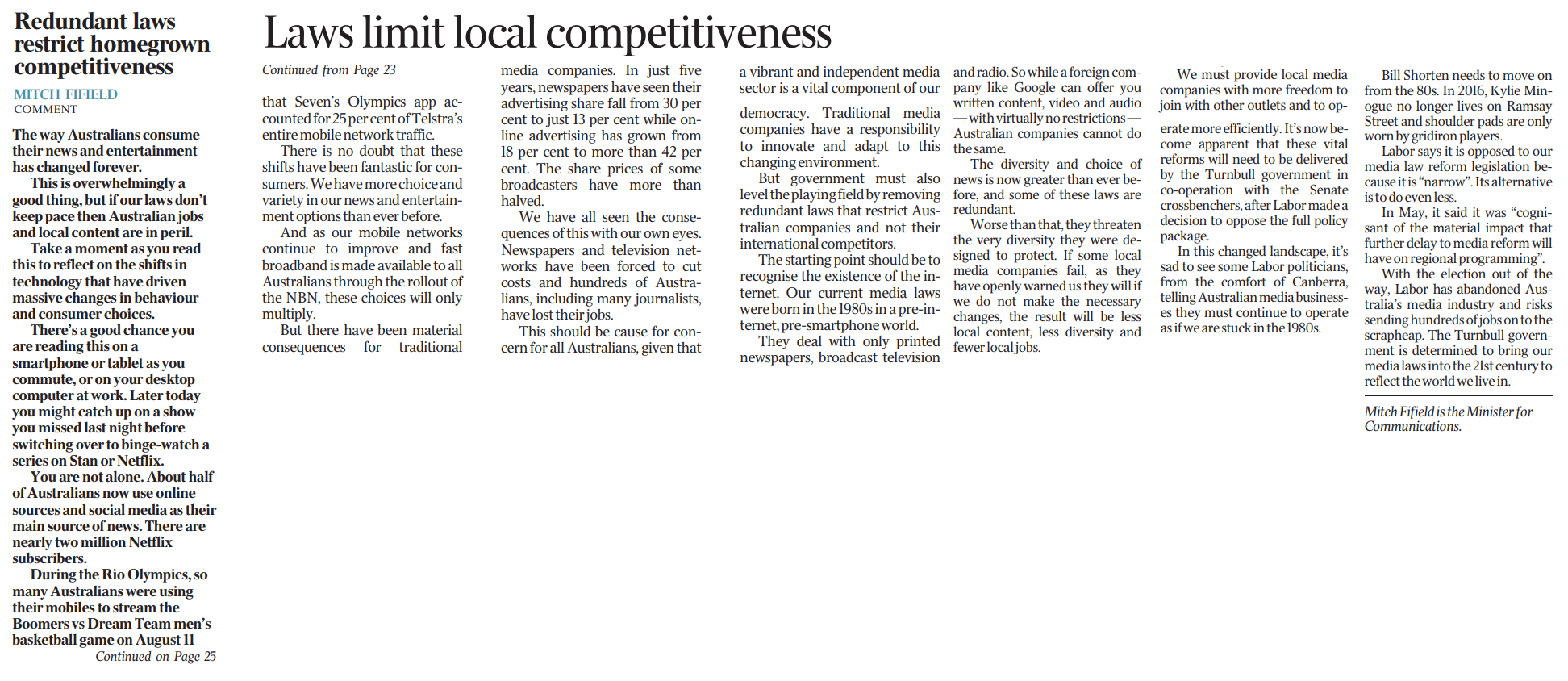Published: 14 November 2016
Author: Mitch Fifield
Publication: The Australian, page 23
Redundant laws restrict homegrown competitiveness
MITCH FIFIELD
The way Australians consume their news and entertainment has changed forever.
This is overwhelmingly a good thing, but if our laws don’t keep pace then Australian jobs and local content are in peril.
Take a moment as you read this to reflect on the shifts in technology that have driven massive changes in behaviour and consumer choices.
There’s a good chance you are reading this on a smartphone or tablet as you commute, or on your desktop computer at work. Later today you might catch up on a show you missed last night before switching over to binge-watch a series on Stan or Netflix.
You are not alone. About half of Australians now use online sources and social media as their main source of news. There are nearly two million Netflix subscribers.
During the Rio Olympics, so many Australians were using their mobiles to stream the Boomers vs Dream Team men’s basketball game on August 11 that Seven’s Olympics app ac-counted for 25 per cent of Telstra’s entire mobile network traffic.
There is no doubt that these shifts have been fantastic for consumers. We have more choice and variety in our news and entertainment options than ever before.
And as our mobile networks continue to improve and fast broadband is made available to all Australians through the rollout of the NBN, these choices will only multiply.
But there have been material consequences for traditional media companies.
In just five years, newspapers have seen their advertising share fall from 30 per cent to just 13 per cent while on-line advertising has grown from 18 per cent to more than 42 per cent. The share prices of some broadcasters have more than halved.
We have all seen the consequences of this with our own eyes. Newspapers and television net-works have been forced to cut costs and hundreds of Australians, including many journalists, have lost their jobs.
This should be cause for concern for all Australians, given that a vibrant and independent media sector is a vital component of our democracy. Traditional media companies have a responsibility to innovate and adapt to this changing environment.
But government must also level the playing field by removing redundant laws that restrict Australian companies and not their international competitors.
The starting point should be to recognise the existence of the internet. Our current media laws were born in the 1980s in a pre-internet, pre-smartphone world.
They deal with only printed newspapers, broadcast television and radio. So while a foreign company like Google can offer you written content, video and audio — with virtually no restrictions — Australian companies cannot do the same.
The diversity and choice of news is now greater than ever be-fore, and some of these laws are redundant.
Worse than that, they threaten the very diversity they were designed to protect. If some local media companies fail, as they have openly warned us they will if we do not make the necessary changes, the result will be less local content, less diversity and fewer local jobs.
We must provide local media companies with more freedom to join with other outlets and to operate more efficiently. It’s now be-
come apparent that these vital reforms will need to be delivered by the Turnbull government in co-operation with t he Senate crossbenchers, after Labor made a decision to oppose the full policy package.
In this changed landscape, it’s sad to see some Labor politicians, from the comfort of Canberra, telling Australian media business-es they must continue to operate as i f we are stuck in the 1980s.
Bill Shorten needs to move on from the 80s. In 2016, Kylie Minogue no longer lives on Ramsay Street and shoulder pads are only worn by gridiron players.
Labor says it is opposed to our media law reform legislation be-cause it is “narrow”. Its alternative is to do even less.
In May, it said it was “cognisant of the material impact that further delay to media reform will have on regional programming”.
With the election out of the way, Labor has abandoned Australia’s media industry and risks sending hundreds of jobs on to the scrapheap. The Turnbull government is determined to bring our media laws into the 21st century to reflect the world we live in.
Mitch Fifield is the Minister for Communications.



